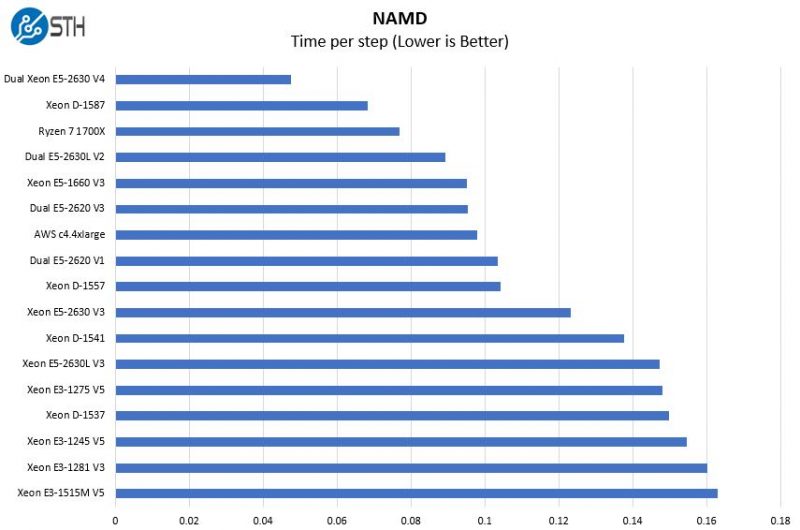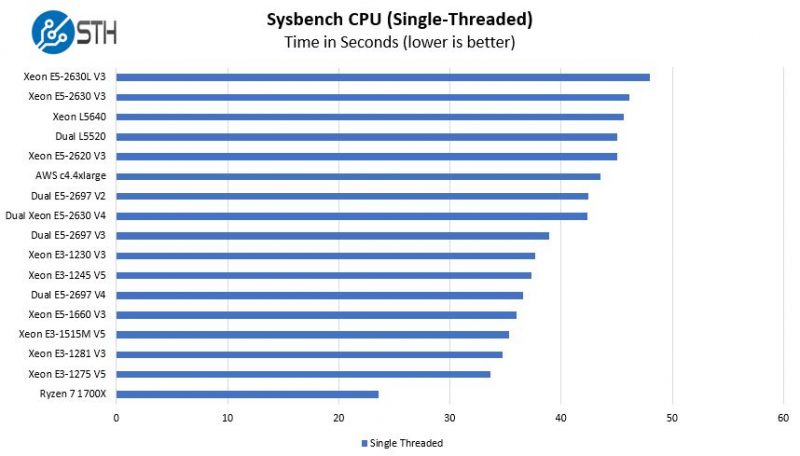It seems farther behind in CPU intensive gaming benchmarks than other intensive CPU benchmarks. It could be just the architecture works that way, but maybe there’s some low hanging fruit software optimizations that have been baked into everything Intel for years, yeah.
For example it appears that some games are losing a lot of performance on Ryzen when SMT is enabled, since Windows is migrating threads to the wrong cores. Which can obviously be fixed, but it’s surprising they didn’t catch this earlier. Because unless my memory is playing tricks on me, they were hit by effectively the same thing for Bulldozer.
Going after the 7700k would have been stupid; AMD was not going to win that war. Better to go against the 68xx/69xx. And they seem to have done great there. IPC behind by a generation, competitive power usage, and way better prices.
(And in all honesty, AMD is probably using Ryzen as a practice run for Naples. That’s the real prize).
RyZen uses a 4 cores + 4 cores model, right, where they don’t share a cache between the sets of four. So I could see how moving a thread to the wrong core could cause a perf hit.
Sort of, no quad channel memory. But for the “I need crazypants number of cores for the rare code I am running that actually scales worth a damn” scenarios, Ryzen does look good. Ironically the compiling code numbers were quite good as @quaro noted
Not sure that’s the cause, since processes would migrate between the two CCXes whether or not SMT is on or not. But I haven’t yet seen a definite explanation on what’s going on, either just a note that it’s happening or having separate SMT enabled/disabled benchmark runs. We’ll probably know more in a few days, once people really dig into it.
How is that ironic? That’s a canonical embarrassingly parallel problem. At work I’ll much rather compile on the 28 core server than my laptop, even though the laptop has faster single core performance :)
I had this theory that Anandtech was sponsored - and may continue to be sponsored - by AMD, almost as the “official” side of their marketing arm. In fact Anandtech is usually the first website that you find when websearching for any technical AMD information. Most of Anandtech’s AMD reviews always felt like softballing and word-count padding - they’re usually more than a dozen pages and yet say very little, and usually compare the AMD processor in question to a very rarified and specific selection of Intel CPUs - which feels to me like they’re trying to not actually say anything technically wrong but give AMD what amounts to the best case possible. It feels like this is confirmed today; Anandtech’s “deep” review of Ryzen has no game benchmarks. Not one.
To be clear, since one has to be nowadays, i’m not saying I think Anandtech “changes” numbers or fakes numbers or lies or anything like that, but that it seems to me instead they set up tests always to put AMD in the best possible light without actually saying anything technically incorrect.
They addressed that on the page describing the benchmark setup. They ran out of time with overclocking / gaming tests. There will be a second part with those: http://www.anandtech.com/show/11170/the-amd-zen-and-ryzen-7-review-a-deep-dive-on-1800x-1700x-and-1700/15
I’ve never understood this viewpoint. If they are trying to target the consumer desktop market at all with Ryzen, this doesn’t seem to make sense as the 7700k is the chip to beat.
Things might change before i buy a new computer in a couple months, but as it stands it seems like i could pay $500 to get significantly worse performance than the 7700k in basically any game AND while the ryzen is no doubt better for muli tasking and some specific tasks, the 7700k still has 4/8 cores so it is no slouch either. Things only get much worse if i try to compare the similarly priced Ryzen 1700 to the I7 7700K. Not to mention the I7 is tried and tested while the ryzen is not only not, but already has the launch issues we come to expect from new hardware.
Maybe if i was building a pure work station the ryzen would be an easy choice, but I feel like if you game at all, picking ryzen over a 7700k seems like a bad idea. The ryzen doesn’t seem like a train wreck, but i think they came in just a bit too below the line to really be competition to Intel. Better luck in the next generation.
According to this review at 1080P, the difference is a lot less. Noticed he’s running a “Gigabyte X370 Gaming 5, 16GB of Corsair Vengeance RAM at 3000MHz” so faster RAM speed?
Seems like the chip to buy is the 1700. 300 bucks, unlocked, and apparently overclocks essentially as high as the others and hits around 3.9.
Seeing some other reviews testing with SMT disabled and getting about 5-10% increases:
http://www.hardware.fr/articles/956-17/jeux-3d-project-cars-f1-2016.html
Edit: Some fun speculation/optimism/wishful-thinking?
Page 14 is particularly interesting for me. For chess Ryzen is da bomb!
It is pretty nuts that it’s actually faster than the $1000 8-core Intel Cpus in a lot of things because its clocked higher. That probably should have been their marketing target rather than consumers/gamers. It would be good for streaming but that’s not exactly a huge market.
Look at this linux performance:
(molecular modeling)
Those Xeon chips are in the $1000 to $1500 range.
I’m happy with my 7700K in my VR/gaming rig, but I’m going to look really close at the Ryzen when I decide to upgrade my video/photo editing PC. Looks like it would pay off there.
But my i7-3960X is still doing pretty well.
So what I’m seeing is “costs 50% less runs 15% slower”
It can’t really be reduced to that. It costs 50% less than the 8-core intel chip, and runs about the same speed per clock as the Broadwell (5th gen core) architecture. That’s why AMD always compares against the i7-6900k, the 8 core broadwell-E chip. Ryzen’s performance is comparable and it costs half as much.
It’s a smidge slower per clock than skylake and kaby, but you get twice as many cores for your dollar. Thing is, skylake and kaby also clock higher and overclock dramatically higher. So they remain a better choice for desktop productivity and gaming.
If I were building a gaming rig today, I would use a 7600k or 7700k, not an 1700X or 1800X.
That assumes you don’t do anything else with your system. I’ve always believed it’s totally worth trading a small amount of performance in already released games (where you will probably be mostly GPU limited in real play settings) to gain a major improvement for other things you might do like video editing/encoding or offline rendering, and in future games.
At broadwell single threaded perf levels that is certainly a heck of a lot more defensible!
Super deep dive from the AnandTech forum:
An important point. 90-95% of all games are either GPU limited or technically non-challenging Indie productions. For these games a “fast enough” CPU is all you need, which Ryzen certainly is. The GPU will do the rest, if there is anything to do.
The data basis for Ryzen’s performance in the remaining 5-10% of the games is too small and completely uneven at this point. On the one hand Ryzen seems to be a bit slower than expected here, but then comes a test result of a round in Civ 6, which should favour Intel’s fast 4-core CPUs, and surprisingly Ryzen is very strong in it. So I think we should give the reviewers a bit more time to test the Anno’s of this world in a reproducable way, to create reliable results.
For anyone still looking at Ryzen and willing to overclock, the 1700 non-X is an increasingly attractive choice.
Ryzen doesn’t overclock much. It’ll get to 3.9/4.0Ghz max. Thing is, the 1700X and 1800X are already there.
1800X = 8cores/16threads, 3.6Ghz base, 4.0Ghz boost, $500
1700X = 8cores/16threads, 3.4Ghz base, 3.8Ghz boost, $400
1700 = 8cores/16threads, 3.0Ghz base, 3.7Ghz boost, $330
The 1700 will overclock to around 4.0Ghz too. This leads to essentially identical performance to the 1800X.
The “X” stands for AMD’s new XFR technology, which uses additional power and thermal capacity to overclock above the boost clock. So technically, since the 1800X has XFR it could overclock over 4.0Ghz. But in reality, Ryzen doesn’t get over 4.0Ghz so that’s actually meaningless.
This makes the 1700 a great value if you can benefit from over 4 cores. If not, and particularly for gaming, the i7-7700k is still a better choice.
There’s some interesting tests in that AnandTech thread where people disable four core somehow, so there’s only one CCX available, and get improvements in some benchmarks at the same clock.

